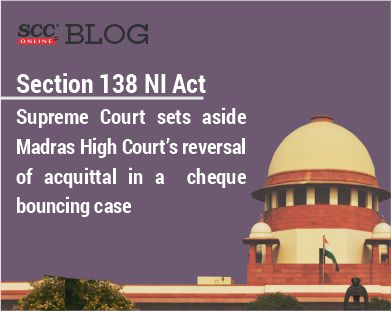Supreme Court: In a combined appeal challenging Madras High Court's decision in a cheque bounce case, the Supreme Court bench of B. R. Gavai* and M. M. Sundresh, JJ. allowed criminal appeals and modified the decree. The Court quashed and set aside the High Court's conviction and orders of sentence, thereby confirming the Trial Court's judgment. As far as the civil appeals are concerned, the Court did not interfere with the High Court's judgment, but modified the decree, restricting the same to the amount already deposited, thereby relieving the appellants.
The Criminal Appeals challenge the common judgment and order of conviction and sentence passed by the Madras High Court whereby the appellant has been convicted under Section 138 of the Negotiable Instruments Act, 1881 (‘the N.I. Act') and has been sentenced to a fine of Rs. 7 Lakhs in each case in respect of two cheques for an amount of Rs. 3.5 Lakhs.
The Civil Appeals challenge the judgments whereby the Original Suits filed by the plaintiff/respondents for recovery of money based on promissory notes were decreed.
In the present matter, the accused issued two signed blank cheques in respondents' favor in 1992. The cheques presented for encashment in 1999 were dishonoured due to non-operative bank account. The respondents initiated legal proceedings under Section 138 of Negotiable Instruments Act, 1881 and a suit for recovery.
The Trial Court gave benefit of doubt to the accused based on the evidence produced in criminal matter. Both the criminal cases were dismissed by the Trial Court, but the High Court reversed the same and convicted the appellant. The High Court decreed original suit for recovery as well.
Hence, the appellants challenged the High Court's decision in both civil and criminal matters before Supreme Court through the present appeal.
In the present matter, the Court relied on Baslingappa v. Mudibasappa (2019) 5 SCC 418 referring to the principles on Sections 118(a) and 139 of the N.I. Act. It lays that the standard of proof for rebutting the presumption in favour of holder of cheques is that of preponderance of probabilities.
Referring to the conviction in the criminal appeals by the High Court, the Supreme Court commented that “The scope of interference in an appeal against acquittal is limited. Unless the High Court found that the appreciation of the evidence is perverse, it could not have interfered with the finding of acquittal recorded by the Trial Court.” The Court agreed with the defense raised by the appellants since it satisfies the standard of “preponderance of probability”. The High Court was not justified in reversing the order of acquittal of the appellant in the Court's opinion.
In civil appeals, the Court coincided with the High Court's observation that in civil matters, adjudication is based on preponderance of probabilities. In criminal cases, the accused is presumed to be innocent, and guilt of the accused should be proved to the hilt; the proof should be beyond all reasonable doubt.
While deciding the present appeals, the Court also observed that “A distinguishing fact between the criminal proceedings and the civil proceedings in the present case is that, while in the criminal proceedings, the complainant had failed to produce the promissory notes, in the civil proceedings, the complainant had proved the promissory notes.”
The Court quashed and set aside the High Court's judgment of conviction in criminal cases, thereby confirming Trial Court's judgments and orders. As far as civil appeals were concerned, the Court decided not to interfere with the High Court's judgments and orders. However, the Court modified the decree restricting the same to the amount already deposited in both civil and criminal proceedings.
[Rajaram v. Maruthachalam 2023 SCC OnLine SC 48, decided on 18-01-2023]
*Judgment by : Justice B. R. Gavai
Advocates who appeared in this case :
For Appellants: Advocate Neha Sharma
For Respondents: Advocate V. Prabhakar






